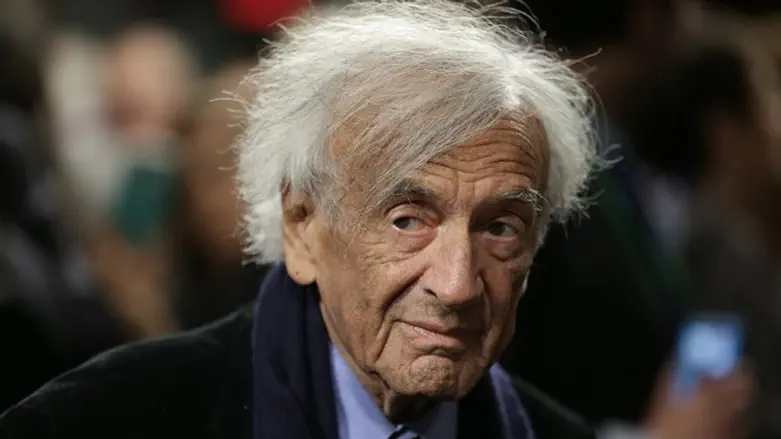
Some people have too much time on their hands and so it was that one particular intellectual thought it was time to bring down Elie Wiesel a peg or two.
In an article that ran with too many words – even one would have been too much – the intellectual accused Wiesel of putting up a false front; that in order to make himself more appealing, Wiesel (who left us last year) downplayed his anger over his suffering at Auschwitz, both as a public figure and namely in his ground-breaking memoir, “Night.” That’s the accusation.
Also, according to that “expert,” whose name I will not mention because more fame he does not need from me, although Shmuley Boteach takes him down in a brilliant rebuttal – Wiesel was privately resentful about the apathy; the lack of understanding in regards to the Holocaust from the world at large and from the Jewish world in particular.
As if survivors have no right to be hurt and keep the pain to themselves.
Indeed, primarily in “Night,” Wiesel kept his (harrowing) story to the facts without embellishments, merely the first element in good writing.
As noted, Boteach answers well but I can’t resist chiming in as I know a thing or two about the topic…as do too many of us who are still among the quick.
First of all, when you’re fooling with Wiesel you’re fooling with the entirety of the Holocaust; never a smart move.
 When you’re fooling with Wiesel you’re fooling with the entirety of the Holocaust; never a smart move.
When you’re fooling with Wiesel you’re fooling with the entirety of the Holocaust; never a smart move.  A man named Anthony Scaramucci found that out just this morning. Scaramucci, who played Trump’s chief of staff for a week or two, and got fired when Trump got wise to him, was caught questioning the historical Six Million figure. That came from him or from a member of his staff. But in any case, Scaramucci is no longer a desired speaker at certain events. He’s being given the cold shoulder.
A man named Anthony Scaramucci found that out just this morning. Scaramucci, who played Trump’s chief of staff for a week or two, and got fired when Trump got wise to him, was caught questioning the historical Six Million figure. That came from him or from a member of his staff. But in any case, Scaramucci is no longer a desired speaker at certain events. He’s being given the cold shoulder.
As I once did to a friend Steve who, after I praised Wiesel as our leading post WWII chronicler, remarked –
“Okay, but he also rakes in all that cash from his speeches.”
I realized then, even more than I had realized before, that people born in America never got it or got it too late, an event so colossal as the Holocaust.
Perhaps that is so because born in the USA, a nation so bountiful, makes it impossible to comprehend an outside world so brutal.
“Steve,” I said, holding my temper, “I make it a point never to judge any man or woman who survived Auschwitz.”
Survivors, in my view, are God’s anointed. This includes my parents and my sister. There was a particular day when my mother visited a long-lost relative on Long Island. Our family was fresh off the boat, the famed Serpa Pinto. Mother was in the kitchen telling her wealthy American-born niece what happened, how everything was lost after Hitler invaded our home in France.
The niece could not take it, so much heartbreak, and pretty much chased my mother out of the house for telling such tales.
“She actually called the police,” my sister Sarah recalls. “It was just too much.” Sarah then explains. “Back then it was still so fresh. People didn’t know. Or didn’t want to know... the word Holocaust did not come up until years later. Our own story was just too overwhelming.”
Likewise for my beloved friend Al it was too overwhelming.
Al survived something else. When Hitler took over the Ukraine the locals came for Al’s mother and sisters and the rest of it Al refused to tell other than what could be imagined. Al came here (the lone survivor of a large religious Jewish family) joined the air force, served in Korea, became a staunch Zionist, learned Hebrew from reading the papers -- and refused to believe in God.
We often drove together to the racetrack. For Al it was his job timing the races. For me it was covering the races for the newspaper, and placing a bet of two.
Al would always say, “Are you teaching your children to be patriotic Americans and to love Israel? Both are the same, you know.”
But when I asked, he would say, ”No, I do not believe in God.” But he would say it loud enough for God to hear.
A man like that can believe or disbelieve anything he wants. It’s not my business to correct him. Not for me to say. Not for me to judge.
Similarly it is nobody’s business to correct Elie Wiesel. You weren’t there. You will never know.
New York-based bestselling American novelist Jack Engelhard writes regularly for Arutz Sheva. Engelhard wrote the international book-to-movie bestseller “Indecent Proposal” and the ground-breaking inside-journalism thriller “The Bathsheba Deadline.” His latest is “News Anchor Sweetheart.” He is the recipient of the Ben Hecht Award for Literary Excellence. Website: www.jackengelhard.com